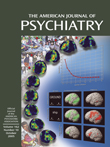Duration of Untreated Psychosis and Time to Treatment Response for Delusions and Hallucinations
Abstract
OBJECTIVE: Duration of untreated psychosis is associated with time to treatment response among patients with schizophrenia. However, individual psychotic symptoms have not been investigated in this context. The authors examined the relationship between duration of untreated psychosis and time to response for hallucinations and delusions. METHOD: Data were available for 118 patients with first-episode schizophrenia in a longitudinal treatment study. Patients received open-label treatment with conventional antipsychotics and were followed for up to 5 years. Duration of untreated psychosis was correlated with time to response for delusions and hallucinations, and predictors of time to response were examined. RESULTS: Time to response for delusions was significantly longer than that for hallucinations. Duration of untreated psychosis was significantly correlated with time to response for delusions but not for hallucinations. In regression analyses, duration of untreated psychosis was the only predictor for time to response for delusions; it was not a predictor for hallucinations. CONCLUSIONS: The results suggest that duration of untreated psychosis may be specifically associated with time to response for delusions. This association may have clinical implications.



